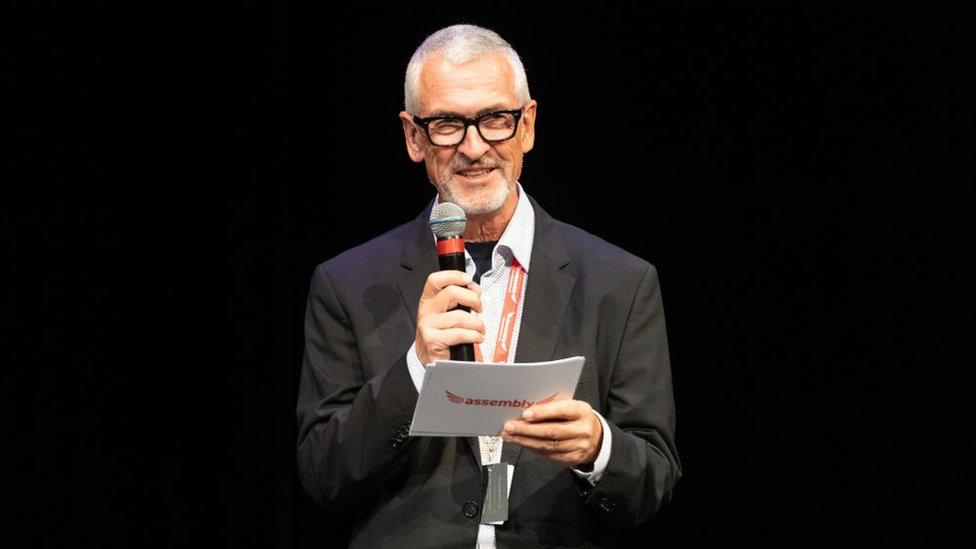Assembly Festival 'could collapse' over £1.5m City of Culture debt
- Published

William Burdett-Coutts is the founder and artistic director of Edinburgh's Assembly Festival
The boss of one of the Edinburgh Fringe's biggest venue operators has warned the company may not survive another year due to a £1.5m debt.
William Burdett-Coutts said the Assembly Festival was surviving on a short-term loan.
He said Assembly organised a festival for Coventry's City of Culture year in 2021, but it has still not been paid by the trust in charge.
The Coventry City of Culture Trust went into liquidation in February.
UK City of Culture is a competition run by UK government's Department for Digital, Culture and Sport (DCMS).
Mr Burdett-Coutts, Assembly's founder and artistic director, criticised Coventry City Council and the DCMS for trying to "wash their hands of the situation".
And he said Assembly could be "dragged down in the trust's wake unless those responsible take action."
It comes as the Edinburgh Fringe launched on Friday.
Speaking to BBC Scotland, Mr Burdett-Coutts said: "Assembly has been presenting shows since 1981 and is an integral part of the Edinburgh Festival Fringe.
"The company is of local, national and international significance working with arts organisations from around the world.
"We have played a significant role in the development of many world-class shows throughout the years and have helped launch the careers of countless household names, from Graham Norton to French and Saunders and many more.
"Assembly on its own plays to an audience equivalent to the live audience of Wimbledon and larger than Glastonbury - to lose that presence would be disastrous for the Fringe."
A DCMS spokesman said Coventry had delivered a successful City of Culture programme that had helped the city secure £172.6 million of investment.
He said: "We continue to back Edinburgh Fringe Festival, and at the spring budget we announced an additional £7m of support for this iconic event, which a number of partners, including Assembly, play an important role in delivering."
Coventry City Council has been contacted for a response.

Assembly Festival Garden returned to Coventry in 2022 for the City of Culture finale
Mr Burdett-Coutts said Assembly's short-term loan would run out at the end of the year.
He said the Coventry festival - Assembly Festival Garden - had been very successful and the city had campaigned to have the event return in 2022.
However, he said that the trust had still not paid Assembly for months after the second festival ended.
"They kept on reassuring us that they would pay their bills and the money was coming," he said.
"But then come January or February we found out that the trust that ran the Coventry City of Culture went into liquidation owing us about £1.5m.
"So it's caused a massive hole in our finances - we're a small organisation so it's not something we can absorb. So we've got to find some way and somebody has to take responsibility."

Crowds flocked to the Royal Mile to welcome the start of the Edinburgh Fringe Festival
Mr Burdett-Coutts added Assembly was in a "very precarious" position for future events. He said the Scottish government had written to DCMS urging it to step in.
"We're in a position where we basically run out of money at the end of the year," he said.
"We can get through this festival and look after everybody from this festival, but the next festival is in question. It depends on if we can find a solution."
He urged stakeholders to support the Fringe as it faced financial challenges from Covid, rising inflation, accommodation costs, and ticket prices struggling to cover outgoing costs.
The DCMS spokesman said it would respond to the Scottish government in due course.
Coventry City Council said it agreed to be the accountable body for the City of Culture 2021, but this did not commit the Council to meet any financial liabilities as it was not a guarantor.
It said the council was the largest creditor of the trust, which was set up as an independent charity.
- Published4 August 2023

- Published24 February 2022
